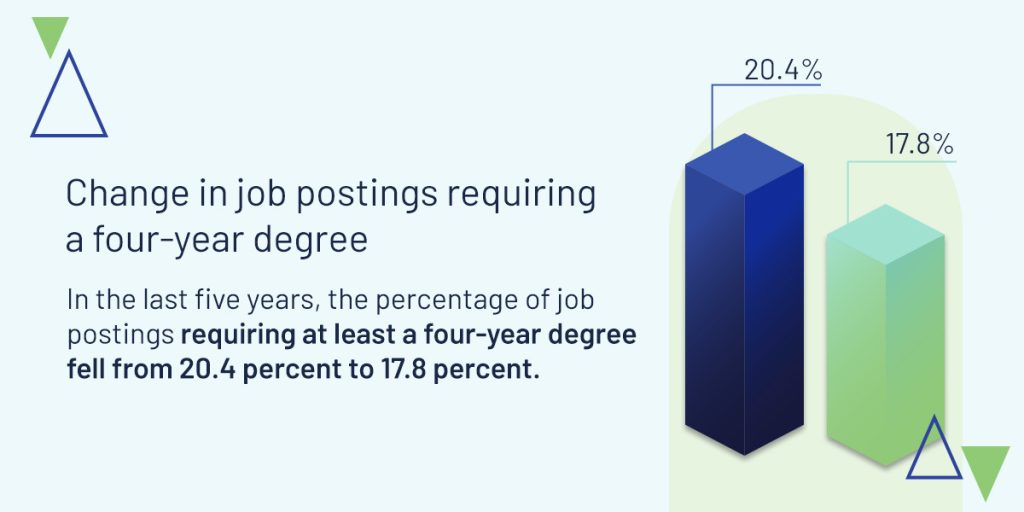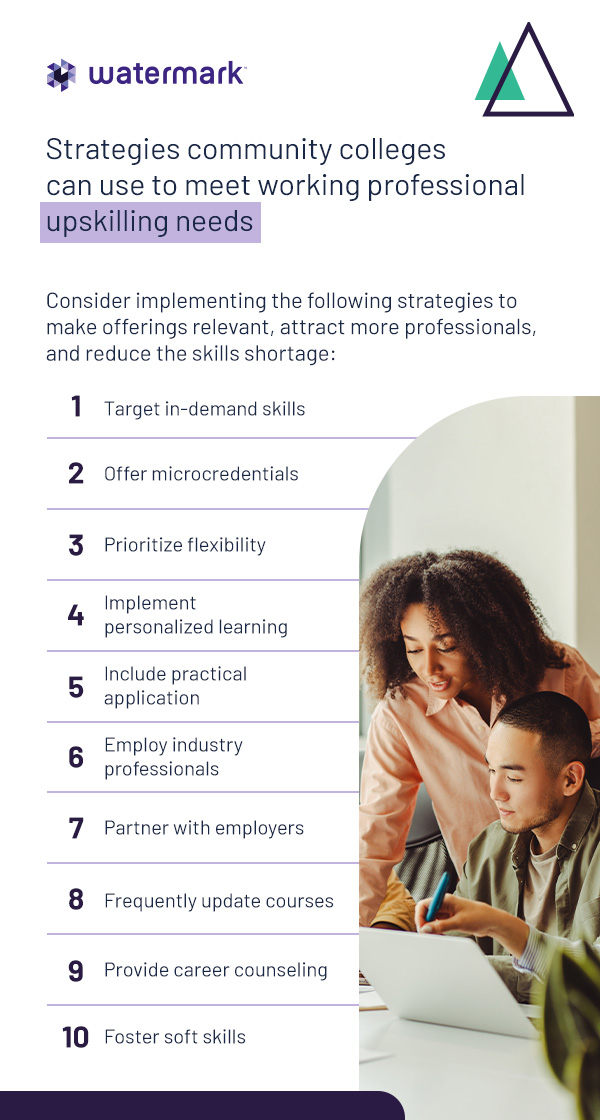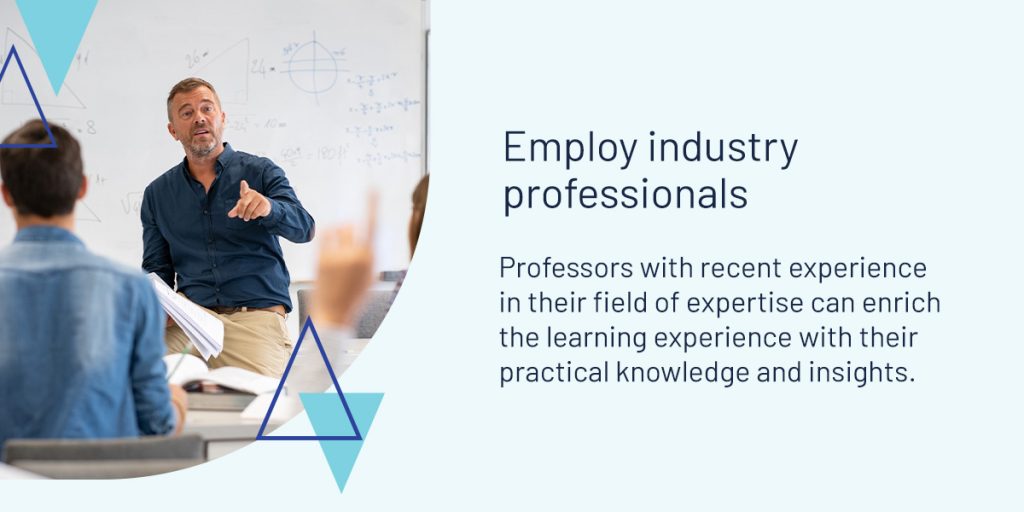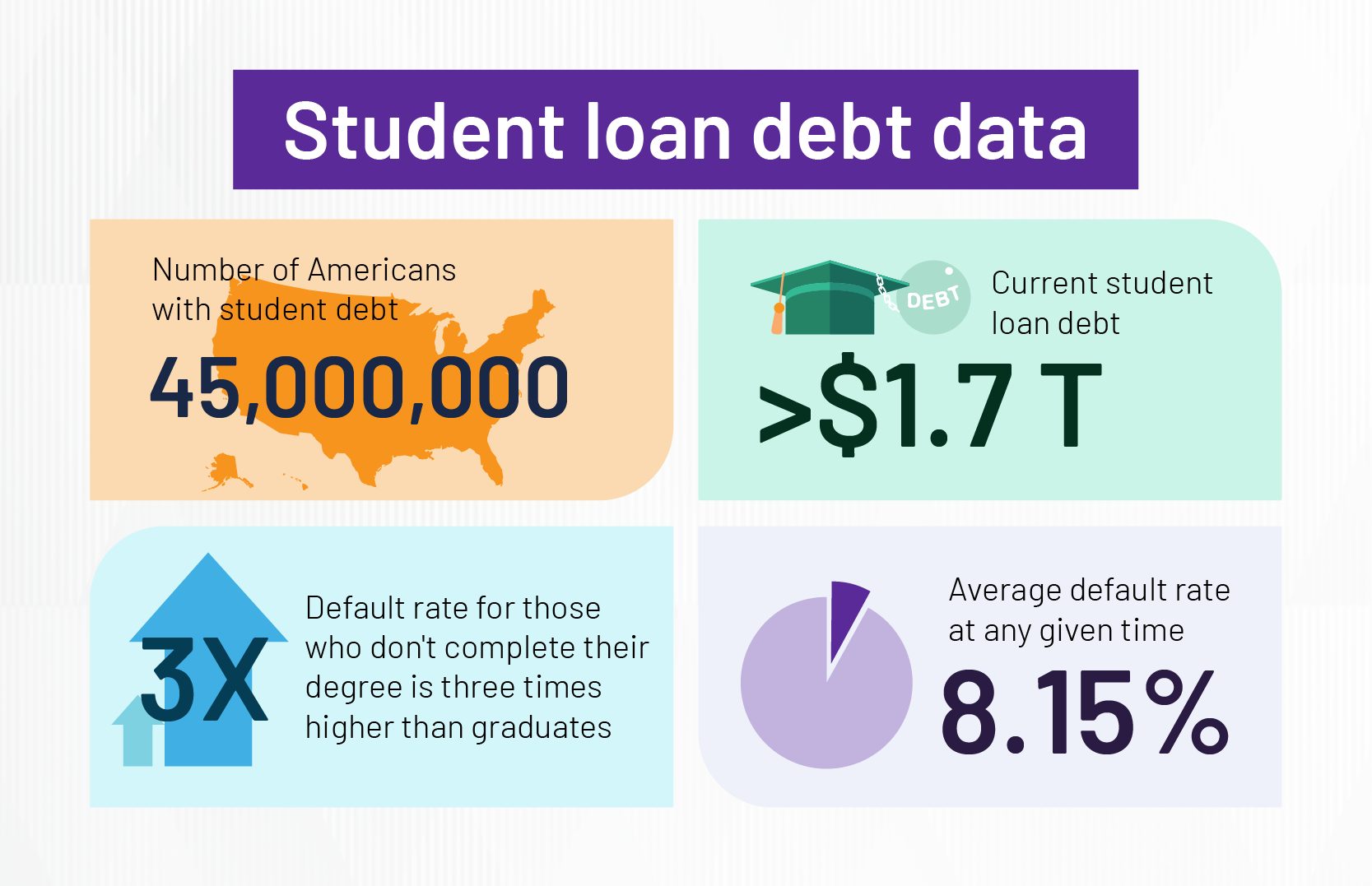
Community colleges have long been the go-to destination for young adults to start their educational journey. However, they also serve working professionals looking to advance their careers or start over. Thanks to their short-term programs and flexible requirements, community colleges are uniquely positioned to help professionals upskill and achieve their career goals.
As the job market evolves, community colleges have seen increased demand for professional development courses. Now more than ever, people want accessible, affordable qualifications that align with job market demands. By staying ahead of these changes and adapting to meet student needs, your institution can become successful in the long term.
Discover how community colleges can change their courses and curriculum to help students upskill and stay relevant in an evolving job market.
Understanding the labor market’s current skill gap
The U.S. job market is changing rapidly thanks to technological advancements and evolving employer expectations. Technology like artificial intelligence (AI), machine learning (ML), and automation have created a huge shift in the market. While these technologies may displace some people, they’re also generating new jobs and opportunities.
Employers now need candidates with specific technical skills, and they’re shifting their approach to skills-based hiring. Skills-based hiring involves evaluating candidates based on skills and experience rather than their qualifications. In the last five years, the percentage of job postings requiring at least a four-year degree fell from 20.4 percent to 17.8 percent.

However, employers are struggling to find candidates with the right skills. Even those with traditional degrees may not have the required hard and soft skills, often due to outdated courses and curriculums. A 2025 study revealed that 74 percent of employers say that they can’t find the skilled talent they need.
The role of community colleges in addressing the skills gap
Community colleges can be part of the solution to the skill shortage thanks to their:
- Shorter courses: Community colleges typically offer shorter associate degrees and certificates that last two years or less. For anyone looking to gain a new skill quickly, these shorter programs are an attractive option. Instead of studying for four or more years, workers can learn competitive skills in as little as a few weeks or months.
- In-demand skills: Community colleges also provide training for specific technical skills. Today, you can find various community college professional development programs that teach in-demand skills in a short time frame. Some examples include coding, content writing, search engine optimization, and project management.
- Cost and flexibility: Community colleges are usually more affordable than traditional four-year institutions and have greater flexibility. Many allow students to complete courses online or part-time and attend classes at unconventional times. Working professionals need this flexibility so they can continue to work and provide for themselves and their families.
Why professionals benefit from upskilling
Many professionals may need to upskill to stay ahead in today’s job market. Upskilling is the process of learning new skills or building upon existing ones. Community college professional development courses help professionals gain the skills they need to excel in their chosen career. Professional development and upskilling can:
- Increase opportunities: Many professionals turn to upskilling to meet job requirements and improve their chances of landing a role. Knowing a certain in-demand skill can also help candidates stand out in a competitive job market. Additionally, learning new skills can help improve their chances of receiving a promotion or salary increase at their current job.
- Improve job security: Upskilling makes employees more valuable, which can reduce their risk of redundancy. Being skilled in various areas also makes professionals adaptable in the face of change. If their role or company requirements change, they can potentially stay and change with it. Adaptability is also a soft skill employers value.
- Keep skills relevant: Professionals need to consistently improve their skills to do their best work and keep clients or customers satisfied. Without growth and improvement, skills may become obsolete, and businesses may struggle to stay ahead of their competition. By upskilling, professionals can ensure their skills are relevant and align with or exceed industry standards.
- Boost job satisfaction: Learning new skills helps seasoned professionals become more confident and fulfilled in their work. These feelings are essential to remaining satisfied and avoiding burnout or boredom. New skills can also make difficult work feel easier, leading to increased engagement and a sense of achievement.
Strategies community colleges can use to meet working professional upskilling needs

While many community colleges already offer shorter courses that benefit working professionals, they can do more to help them succeed in today’s job market. Consider implementing the following strategies to make offerings relevant, attract more professionals, and reduce the skills shortage:
1. Target in-demand skills
One of the most important things you can do for your community college is to ensure the skills you teach align with current industry trends. Some skills become more highly sought after by employers, which makes workers seek out training for them. If your institution offers courses for in-demand skills, it can capitalize on the demand and increase enrollment.
Skill popularity fluctuates regularly, so your institution must keep tabs on the market and identify changes as they happen. Then, you can adjust course offerings to reflect demand and retire low-return programs. Some ways to identify in-demand skills include:
- Monitoring job boards and job descriptions to look for trends.
- Collaborating with businesses to understand their needs.
- Gathering insights from employees across various industries.
- Requesting feedback from alumni to identify skill gaps.
- Reviewing timely industry reports and labor statistics.
2. Offer microcredentials
Associate degrees and diplomas are shorter than four-year degrees, but professionals may need to upskill in even less time. To accommodate their needs, your institution can offer microcredentials. A microcredential is a small certification students can get from completing a short, highly focused course. They typically take a few weeks or months to finish and allow students to learn a specific skill. Once students can demonstrate the competency, they’ll receive a digital badge or certificate to add to their CV.
3. Prioritize flexibility
Community colleges can encourage professionals to upskill by making it easier for them to study. Most higher education institutions have implemented online distance learning, and students should have the choice between attending classes in person or online. Class times should have a flexible schedule to allow students to attend when they’re able, such as early in the morning or late in the evening.
Another factor to consider is allowing flexibility with the course completion timeline. You may find that students are more successful when they can complete their learning at their preferred pace, without the pressure of deadlines. Allowing students to pick and choose concepts they want to learn in the course and the order in which they do them may also help.
4. Implement personalized learning
Personalized learning is an approach to education made possible through AI and ML. It involves collecting student data on e-learning platforms to automatically tailor the learning experience to an individual’s unique needs, preferences, and pace.
For example, AI learning programs can assess whether a student needs more help with a topic and provide targeted resources to boost their understanding. They can also identify which instructional methods and content types a student benefits from the most and alter the course accordingly.
5. Include practical application
Professionals in the working environment are looking for community college courses that can noticeably improve their capabilities. Learning new information and theories is helpful, but they’re often just hypothetical. To cement what students learn, you can include practical application opportunities within courses. Some examples include workshops, internships, research projects, competitions, simulations, case studies, and mentorship.
Practical application is the process of applying learned knowledge to real-world scenarios. It provides a beneficial experience where students encounter real challenges and must use problem-solving skills to overcome them. Practical experience can also make concepts clearer and more comprehensible.
6. Employ industry professionals

Another way to ensure courses are relevant to professionals is by hiring industry professionals to teach. Professors with recent experience in their field of expertise can enrich the learning experience with their practical knowledge and insights. They’re also familiar with the latest trends, technology, and practices, giving students the most up-to-date information. Additionally, they know which skills benefit professionals in the workplace and can help students cultivate desirable qualities.
7. Partner with employers
Community colleges can also strengthen their programs by collaborating with local employers. Upskilling with community college courses is a strategy many professionals use to find a new job. To help students achieve this goal, your institution can partner with local businesses to understand their needs. With this knowledge, you can develop courses that equip students with skills that employers are actively searching for.
Some community colleges also take their partnerships further by creating employment pipelines. For example, they can partner with a business that pledges to hire a certain number of graduates after course completion. They can also pledge to give graduates priority for interviews, ensuring they have a greater chance of landing a job. This way, courses can upskill workers and directly result in employment opportunities.
8. Frequently update courses
Industries change quickly, and your institution must adapt to continue providing relevant education. Stay informed of industry changes related to the courses you offer, and then make adjustments where needed. You can add new information and learning techniques to align with what employers need. You can also remove information that’s become obsolete or not as important. Creating a network of industry professionals that serve as advisories is a fantastic strategy for staying ahead of trends.
You can also collect data to track student progress through courses and identify improvement areas. Their feedback is invaluable and can highlight areas that need the most attention. Making improvements based on student opinions and experience can help your institution boost engagement and completion rates.
9. Provide career counseling
Even if a student only takes a short professional development course at community college, they can still benefit from support and counseling. Many working professionals are doing what they can to improve their careers, but they may be struggling financially or emotionally. Struggling students can take longer to complete their course or drop out, which is an undesirable outcome for them and your institution.
Point them toward your institution’s support resources so they know how to ask for help. Think tutoring services, mental health counseling, academic advising, and job search assistance. You can also provide targeted career counseling to assist professionals in making important career decisions. With this guidance, they may even choose to complete other courses at your community college in the future.
10. Foster soft skills
Today, employers are looking for candidates who possess desirable soft skills. Soft skills are general traits and characteristics, whereas hard skills are something technical students learn through education. Many people possess soft skills thanks to their life experiences, but educational institutions can prioritize helping students develop soft skills that benefit their careers.
Students can develop soft skills by participating in student leadership roles, community service programs, extracurricular activities, and internships. The soft skills they learn can help them handle stress, work better in teams, and overcome challenges. Employers value soft skills like:
- Communication: Effective communication happens when you convey a message that others clearly understand. This skill is vital in the workplace as people rely on communion to complete tasks. When professionals learn to actively listen, use the right communication methods, and speak clearly and concisely, they can improve their communication skills and build stronger working relationships.
- Critical thinking: Critical thinkers gather facts and evidence to make informed decisions quickly. Professionals encounter challenges daily that require critical thinking to make the best calls, like conflict, tight deadlines, and unexpected changes. Encouraging students to engage in problem-solving, asking questions, and reflecting on decisions can help them develop this skill.
- Time management: Using time effectively to accomplish tasks is a vital skill professionals need in the workplace and during their studies. Employers value workers with good time management skills as they are reliable and complete tasks timeously. Professionals can learn time management at community colleges through workshops, study groups, and professor guidance.
Align courses with market trends through Watermark Planning & Self-Study
Watermark creates award-winning software specifically for higher education institutions. Our tools help you collect, analyze, and use data to drive decision-making regarding student, faculty, and institutional success. To address the challenge of keeping up with market trends and industry requirements, we partnered with Lightcast, a trusted global labor market data provider.
Planning & Self-Study users have access to timely, curated market data. This information can help your institution better understand the market landscape and ensure programs and courses remain relevant. The software also allows you to streamline planning and program review processes, driving more impactful program improvement.
Empower students to meet job market demands by trying out Watermark software today. Browse our range of available solutions and request a demo to get started.

































































































































































































































































































































































































